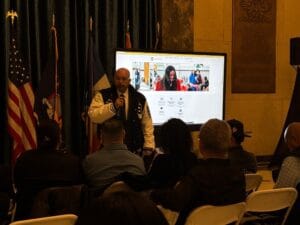EDUPEACE| Industry 4.0 versus Education 4.0

Prof. Mahfouz A. Adedimeji
The previous Industrial Revolutions or Industry 1.0, Industry 2.0 and Industry 3.0 naturally served as a cumulative impetus to the evolution of the still emerging Fourth Industrial Revolution or Revolution 4.0.

The beginning of this revolution is attributed to a future project known as Industry 4.0 officially initiated by Germany in 2011. Since then, many organizations and industry associations have keyed into the project with huge investments made in areas like additive manufacturing, robotics, Artificial Intelligence (AI) and other cognitive technologies, advanced materials and augmented reality.
Industry 4.0
Basically, Industry 4.0 is the digital transformation of manufacturing/production and value creation processes. As a new stage in the organization and control of the industrial value chain, it is the information-intensive transformation of manufacturing (and related industries) in a connected environment of Big Data, people, processes, Services, systems and IOT-enabled industrial assets as a means of realizing smart industry and ecosystems of industrial innovation and collaboration.
Core to the basis of Industry 4.0 is cyber-physical systems (e.g. smart machines) which use modern control systems with embedded software systems that dispose of an Internet address to connect and be addressed via the Internet of Things.
Through this process, products and means of production get networked and communicate, allowing new ways of production, value creation and real time optimization. In other words, Industry 4.0 is the intelligent networking of machines and processes for industry with the help of information and communication technology.
The Big Data environment canvassed and advanced by Industry 4.0 foregrounds self-aware and self-learning techniques while health management algorithms are created to implement current data technologies.
This Revolution is being activated through the use of cyber-physical systems that feature real-time responsiveness, replacing Programmable Logic Controller (PLC).
These have implications for machines and robotics to be controlled by automation systems equipped by machine learning algorithms. As some 20th Century manufacturing executions systems were found to be limited in the technology that would make their complete implementation possible, the Internet of Things (IOT) is created “to connect with manufacturing techniques to enable integrated systems to share information, analyse its use to guide intelligent actions”.
While Industry 3.0 focuses on Automation (IT)/Electronics manifesting in the computer/internet, PLC/robotics, digital manufacturing and digitization, automation, electronic/digital networks and digital machines, Industry 4.0 focuses on Smart Automation, which is exemplified by Autonomous Machines, advanced robotics, Big Data/Analytics and Cloud Management, IOT, Machine Learning and Artificial Intelligence and cyber-physical systems.
Industry 4.0 is characterized by moreautomation than what existed in Industry 3.0, bridging the physical and digital world through cyber-physical systems enabled by industrial IOT, shift from a central industrial control system to one where smart products define the production steps, closed-looped data, control systems and personalization/customization of products.
It is a vision and concept in motion with the goal of enabling autonomous decision-making processes, monitoring assets and processes in real time, enabling equally real-time connected value creation networks through the early involvement of stakeholders as well as vertical and horizontal integration.
Education 4.0
Education 4.0 is a response to the changing skills requirements of the industry and a vision for the future of education. Otherwise known as education for innovation or innovation-producing education, Education 4.0 is the type in which students act as creators of their own paths in the learning process.
The approach will not only develop knowledgeable students but also students who can create their own means and innovate applications of knowledge.
Essentially, Education 4.0 is a new approach that reinterprets the concepts of learning, students, teachers andschool according to the needs of Industry 4.0. In this regard, learning is blended as it combines online materials with the traditional classrooms achieving flipped classrooms.
Students are responsible for their own learning, which is practice-based, as they as afforded individualized educational opportunities and allows the opportunity of learning anywhere anytime.
Education 4.0 affords 21st Century skills which comprise individual skills, interpersonal skills, life skills, applied skills, labor skills, non-cognitive skills, learning and innovation skills, knowledge, media and technology skills as well as social and affective skills.
In his essay, “Education 4.0…the future of learning will be dramatically different in school and throughout life”, Fisk (2017) identifies the nine trends in Education which are summarized as follows:
First, learning can take place anytime and anywhere as e-learning tools offer great opportunities for remote, self-paced learning. Second, learning will be personalized to individual students as they will be introduced to harder tasks only when a certain level of mastery is achieved. Third, students have a choice in determining how they want to learn as they choose learning tools and techniques they prefer even if the institutions set the learning outcomes.
Here, students can enjoy blended learning, flipped classrooms and BYOD (Bring Your Own Device) approach. Fourth, students will be exposed to more project learning as they are required to apply their knowledge to complete short-term projects which enhance their organizational, collaborative and time management skills.
Fifth, students will be exposed to more hands-on learning through field experience such as internships, mentoring and collaborative projects.
Sixth, students will be exposed to data presentation in which they are required to apply their theoretical numbers to reasoning while using their reasoning skills to make inferences based on logic.
Seventh, students will be assessed differently and the conventional platforms to assess students may become obsolete. Eighth, students’ opinions will be considered in designing and updating the curriculum and lastly, students will become more independent in their own learning consolidating the role of teachers as facilitators.
Education 4.0 is Education Next, which is still emerging with its reliance on AI and Learning Analytics or the use of intelligent data, learner-produced data and analysis models to discover information and social connections to predict and advise on learning.
COMPLEX PROBLEMS AND SIMPLE SOLUTIONS
As long as life exists, there would always be problems but it is our attitude to those problems that makes the difference. To achieve inner peace and maintain our sanity, it is better to think deeply and proffer simple solutions to problems, no matter how complex they come.
There are three keys on the keyboard that speak to this desideratum: Alt, Ctrl and Delete. In this respect, you are always to seek alternative solutions, control yourself and delete anything that can give you any headache or depression from your mind.
A teacher once wrote “36x +yx – 2/3yx+3x (88y +12x) b=0” with the instruction to his pupil, Hassan, “Solve the problem.” Hassan looked at the complex equation, picked a duster and wiped it off, saying, “Problem solved.”
There are many complex problems in life that are beyond our capacity that we often worry about whereas the right approach is to clean them off and move on. Whether it is bad news, a quarrel, an argument or someone just wants to frustrate you, just brush them aside and move on.
You will always find alternatives, if you take control of the situation. You realize that there are always options deleting issues and toxic people from mind is an approach to having inner peace.
The situations may be political, social, economic or otherwise, just control yourself, find alternative ways or delete the problems outright. Life is short and ultimately, we have all we need but it is what we want that often gives us distress.













